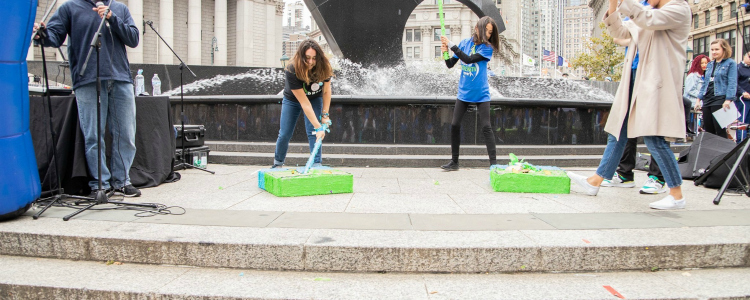Why I Smash Stigma
I started believing that I was broken and unworthy as an infant. I wasn’t thin enough, I wasn’t smart enough, I wasn’t attractive enough, I just wasn’t enough, period. I developed a full-blown eating disorder when I was 14 years old.
For most of my life, I let a cold, black and white metal scale dictate my worth. I stepped on and off of the scale throughout my childhood, my adolescence, and my early adulthood. I let an ambiguous number dictate how I felt about myself.
The scale told me who I should be. It told me that if I weighed less, I would be accepted by society. The scale was charged with control. There were many areas of my life that I lacked control in, but I always perceived power over that number. In addition, the scale provided a source of validation. If I had worked out and eaten well, I expected the scale to provide a stamp of approval.
In high school, I was applauded and praised for losing weight. As the number dropped, the compliments rolled in. In actuality, I was miserable. I lost my menstrual cycle, isolated myself from my friends, and developed low bone mineral density. My health was going down the drain, but society naturally assumed that I was thriving!
My obsession with numbers led me to a career in health and wellbeing. I studied nutrition and exercise science throughout my undergraduate and graduate career. I was taught that “obesity” was the enemy, and so my life goal was to eradicate it (insert eye roll here). Ultimately, I wanted to teach other people how to be “healthy,” and I truly believed that weight loss was the answer.
Throughout my career, I was consistently reminded the importance of weight, body composition, and waist circumference. I had colleagues insist that scale smashing was unacceptable because the scale provided “valuable information” about health. I strongly believed that in order to be a true leader, I needed to model the societally constructed image of health and beauty. As I continued to embrace these thoughts and messages, I continued to live in my eating disorder.
Linda Bacon’s research on Health at Every Size (HAES)® changed my life. HAES® offers a weight neutral approach to health and well-being. It taught me to move and nourish my body from a place of self-love and self-compassion. Not only did I learn to stop fixating on a number, but I also learned to focus on my internal body cues instead. In therapy, I learned how to honor my emotions without controlling food.
I continued to learn that the pharmaceutical companies have a monopoly on obesity research and that health is not visible. In actuality, body mass index (BMI) is not correlated with health status and our weight is largely influenced by genetics. I thought that my negative relationship with nutrition and fitness was a willpower issue. I was wrong. It was actually a social justice issue related to weight stigma and the fear of fat.
When I first heard about the fat positive movement, I naturally panicked. Fat positivity contradicted everything that I had learned in school about heath. Society gives the word “fat” a negative connotation. We naturally assume that those who carry extra fat are “bad” or “lazy” and we therefore discriminate against those who live in larger bodies. In reality, “fat” is just a descriptor that should be completely neutral.
My weight had nothing to do with who I was as a person. It wasn’t correlated with my commitment to public service, advocacy, and giving back to others. My weight was nothing more than the gravitational pull from the earth onto my body.
With time, I realized that loving my body at every size was the key to developing optimal health and well-being. As I embraced my figure, I removed a level of shame which ultimately led to a healthier relationship with nutrition and fitness.
On October 6, 2019 I attended the NYC NEDA Walk. I bought a raffle ticket to smash a scale piñata. Before I knew it, the raffle ticket number was called, and I was on the stage with a bat in my hand and 1,000 people standing in front of me.
That moment came with a strong sense of pride and imposter syndrome. I immediately thought, Why me? There were so many people who had eating disorders that were worse than mine and deserve to smash the scale more than I do. I should have given the opportunity to somebody else.
Luckily my therapist helped me see it through a different lens. Smashing the scale wasn’t about who had it the worst. It was about connection. It was about opening myself up so that others could share a moment of pure joy and not feel so alone. It was about putting an end to my own invalidation and surrounding myself with those who empower me to be better and do better.
The moment was so much more than smashing a scale piñata. It was the smashing of shame, stigma, self-doubt, and the inner critic. Smashing the scale was the ultimate expression of infinite self-love and self-compassion.
My final words are: If you struggle, I give you endless permission to dismiss the number on the scale and to start celebrating the beauty that makes you uniquely you. My fellow warriors, keep fighting and never stop smashing!
Jocelyn Resnick (she/her) earned her Masters degree in Public Health (MPH) from the George Washington University. She is also a Certified Health Education Specialist (CHES) and a Life Coach. Jocelyn’s passion lies in empowering others to change the world! You can find her organizing the Atlanta NEDA walk, advocating for mental health reforms on Capitol Hill, and rallying for women’s rights and social justice!





